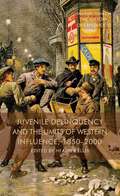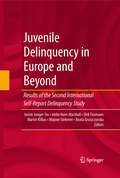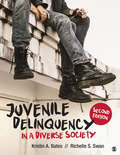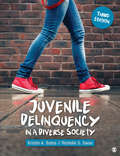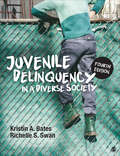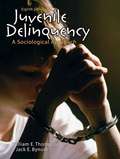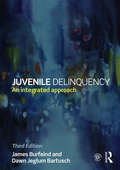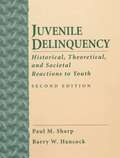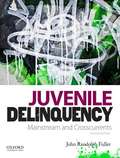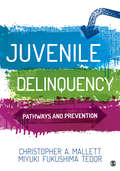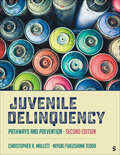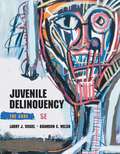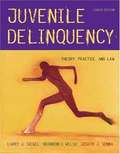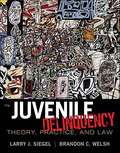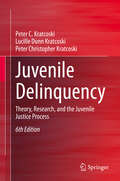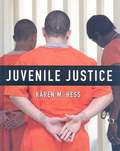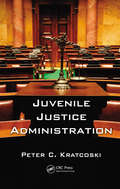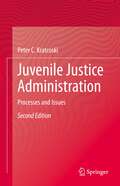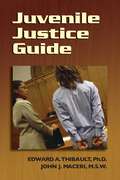- Table View
- List View
Juvenile Delinquency and the Limits of Western Influence, 1850�2000
by Heather EllisJuvenile Delinquency and the Limits of Western Influence, 1850-2000 brings together a wide range of case studies from across the globe, written by some of the leading scholars in the field, to explore the complex ways in which historical understandings of childhood and juvenile delinquency have been constructed in a global context. The book highlights the continued entanglement of historical descriptions of the development of juvenile justice systems in other parts of the world with narratives of Western colonialism and the persistence of notions of a cultural divide between East and West. It also stresses the need to combine theoretical insights from traditional comparative history with new global history approaches. In doing so, the case studies examined in the volume reveal the significant limitations to the influence of Western ideas about juvenile delinquency in other parts of the world, as well as the important degree to which Western understandings of delinquency were constructed in a transnational context.
Juvenile Delinquency in Europe and Beyond
by Josine Junger-Tas Martin Killias Ineke Haen Marshall Beata Gruszczynska Majone Steketee Dirk EnzmannJuvenile Delinquency in Europe and Beyond: Results of the Second International Self-Report Delinquency Study presents the status of juvenile crime and delinquency and its backgrounds in many of the European Union member states as well as in the United States, Canada, Venezuela and Surinam. The book includes information on key issues in juvenile delinquency such as victimization of young people, alcohol and drug use and its relation to juvenile crime, involvement in youth gangs, immigration, family and school and neighborhood situations. It provides insight into different views on what can be considered juvenile crime; what acts are subsumed in its definition and when we can speak about structural delinquent behavior. These insights are based on self-reported information systematically and simultaneously collected from about 70,000 12-15 year old youths in 28 countries. Until recently, the self-report methodology has not been applied on such a large scale in an international context. The results of this survey provide new and unexpected data about those young people who structurally commit criminal acts, as well as on the frequency of the behavior and the conditions that have an impact on offending. The wealth of descriptions and insights in delinquency of all these countries will be of great interest to scholars, students and practitioners because of the special character of the publication; it is a book of reference to everyone interested in the backgrounds of juvenile delinquency.
Juvenile Delinquency in a Diverse Society
by Dr Kristin Bates Richelle S. SwanJuvenile Delinquency in a Diverse Society, Second Edition presents students with a fresh, critical examination of juvenile delinquency in the context of real communities and social policies—integrating many social factors that shape juvenile delinquency and its control, including race, ethnicity, class, gender, and sexuality. Authors Kristin A. Bates and Richelle S. Swan use true stories and contemporary examples to link theories of delinquency not just to current public policies, but to existing community programs—encouraging readers to consider how theories of delinquency can be used to create new policies and programs in their own communities. Readers will gain a foundational understanding of the social diversity that contextualizes varying experiences and behavior of juvenile delinquency, as well as a deeper appreciation for the policies, social justice, and community programs that make up the juvenile system.
Juvenile Delinquency in a Diverse Society
by Dr Kristin Bates Richelle S. SwanJuvenile Delinquency in a Diverse Society, Second Edition presents students with a fresh, critical examination of juvenile delinquency in the context of real communities and social policies—integrating many social factors that shape juvenile delinquency and its control, including race, ethnicity, class, gender, and sexuality. Authors Kristin A. Bates and Richelle S. Swan use true stories and contemporary examples to link theories of delinquency not just to current public policies, but to existing community programs—encouraging readers to consider how theories of delinquency can be used to create new policies and programs in their own communities. Readers will gain a foundational understanding of the social diversity that contextualizes varying experiences and behavior of juvenile delinquency, as well as a deeper appreciation for the policies, social justice, and community programs that make up the juvenile system.
Juvenile Delinquency in a Diverse Society
by Richelle S. Swan Dr. Kristin A. BatesJuvenile Delinquency in a Diverse Society presents a fresh, critical examination of juvenile delinquency in the context of real communities and social policies— addressing many social factors that shape juvenile delinquency and its control, including race, ethnicity, class, gender, and sexuality. Authors Kristin A. Bates and Richelle S. Swan use true stories and contemporary examples to link theories of delinquency to current public policies and to existing community programs, encouraging readers to consider how theories of delinquency can be used to create new policies and programs in their own communities. The Third Edition includes a new chapter on policing and juveniles, updated scholarship that strengthens the integration of both classic and cutting-edge research, and updates to the book&’s supportive pedagogical features to reflect current events and the experiences of diverse populations of youth.
Juvenile Delinquency in a Diverse Society
by Richelle S. Swan Dr. Kristin A. BatesJuvenile Delinquency in a Diverse Society presents a fresh, critical examination of juvenile delinquency in the context of real communities and social policies— addressing many social factors that shape juvenile delinquency and its control, including race, ethnicity, class, gender, and sexuality. Authors Kristin A. Bates and Richelle S. Swan use true stories and contemporary examples to link theories of delinquency to current public policies and to existing community programs, encouraging readers to consider how theories of delinquency can be used to create new policies and programs in their own communities. The Third Edition includes a new chapter on policing and juveniles, updated scholarship that strengthens the integration of both classic and cutting-edge research, and updates to the book&’s supportive pedagogical features to reflect current events and the experiences of diverse populations of youth.
Juvenile Delinquency in a Diverse Society
by Richelle S. Swan Kristin A. BatesJuvenile Delinquency in a Diverse Society, Fourth Edition presents a fresh, critical examination of juvenile delinquency in the context of real communities and social policies - addressing many social factors that shape juvenile delinquency and its control, including race, ethnicity, class, gender, and sexuality. Authors Kristin A. Bates and Richelle S. Swan use true stories and contemporary examples to link theories of delinquency to current public policies and to existing community programs, encouraging readers to consider how theories of delinquency can be used to create new policies and programs in their own communities.
Juvenile Delinquency in a Diverse Society
by Richelle S. Swan Kristin A. BatesJuvenile Delinquency in a Diverse Society, Fourth Edition presents a fresh, critical examination of juvenile delinquency in the context of real communities and social policies - addressing many social factors that shape juvenile delinquency and its control, including race, ethnicity, class, gender, and sexuality. Authors Kristin A. Bates and Richelle S. Swan use true stories and contemporary examples to link theories of delinquency to current public policies and to existing community programs, encouraging readers to consider how theories of delinquency can be used to create new policies and programs in their own communities.
Juvenile Delinquency: A Sociological Approach
by William Thompson Jack BynumTaking a sociological approach, this text discusses delinquency as it relates to and emerges from the youth's family, neighborhood, school, peer group, social class, and overall cultural and social environment. The authors incorporate contributions from sociologists, psychologists, social workers, criminologists, and other specialists who have sought to understand, explain, control, and prevent juvenile delinquency.
Juvenile Delinquency: An integrated approach (Criminal Justice Illuminated Ser.)
by Dawn Jeglum Bartusch James BurfeindThis book offers a comprehensive introduction to juvenile delinquency by defining and describing juvenile delinquency, examining explanations for delinquent behavior, and considering contemporary efforts to control delinquency through prevention and juvenile justice. The text cultivates an understanding of juvenile delinquency by examining and linking key criminological theories and research. Coverage includes: the historical origins and transformation of "juvenile delinquency" and juvenile justice; the nature of delinquency, addressing the extent of delinquent offenses, the social correlates of offending and victimization (age, gender, race and ethnicity, and social class), and the developmental patterns of offending; theoretical explanations of delinquency, with insights from biosocial criminology, routine activities, rational choice, social control, social learning, social structure, labeling, and critical criminologies; evidence-based practice in delinquency prevention and contemporary juvenile justice. Fully revised and updated, the new edition incorporates the latest theory and research in the field of juvenile delinquency and provides expanded discussion of contemporary juvenile justice reform, evidence-based practice in delinquency prevention, and disproportionate minority contact throughout the juvenile justice process. This book is essential reading for courses on juvenile delinquency and juvenile justice. The book is supported by a range of compelling pedagogical features. Each chapter includes key terms, learning objectives, an opening case study, box inserts that provide practical application of theory and research, critical thinking questions, suggested reading, useful websites, and a glossary of key terms. A companion website offers an array of resources for students and instructors. For students, this website provides chapter overviews, flashcards of key terms, and useful websites. The instructor site is password protected and offers a complete set of PowerPoint slides and an extensive test bank for each chapter--all prepared by the authors.
Juvenile Delinquency: Historical, Theoretical, and Societal Reactions to Youth
by Paul M. Sharp Barry W. HancockA collection of readings in juvenile delinquency combining historical pieces as well as classic and contemporary theoretical articles. Some of the issues covered include female delinquency, gangs, violence among teens, and societal reactions to youth.
Juvenile Delinquency: Mainstream and Crosscurrents
by John Randolph FullerJuvenile Delinquency: Mainstream and Crosscurrents, Second Edition, is a broad, comprehensive introduction to one of society's most pressing problems. Offering a highly analytical yet balanced approach, the book gets readers thinking critically about important real-world issues including the effects of inequality, race, class, and gender on juvenile delinquency and the justice system. Lively, engaging, and accessible, Juvenile Delinquency is ideal for delinquency courses in both criminal justice and sociology departments.
Juvenile Delinquency: Pathways and Prevention
by Christopher A. Mallett Miyuki Fukushima Tedor"This textbook is an excellent tool that explores issues impacting juvenile delinquency, theories, system response, community interventions, and effective programs to help reduce delinquency." —Robbin Day Brooks, MSW, CPP, Arizona State University’s School of Criminology & Criminal Justice Juvenile Delinquency: Pathways and Prevention explores the pivotal roles that family, trauma, mental health, and schools have on juvenile delinquency, while exploring opportunities for prevention and intervention. Authors Christopher A. Mallett and Miyuki Fukushima Tedor draw from years of experience working with juvenile offenders to shed light on the nature of delinquency and the diverse pathways to juvenile delinquency, while offering evidence-based techniques for preventing and rehabilitating youthful offenders. Clear explanations of the concepts and thought-provoking case studies move students beyond memorization—encouraging them to think critically about juvenile delinquency and make recommendations for better practices and policies. Give your students the SAGE edge! SAGE edge offers a robust online environment featuring an impressive array of free tools and resources for review, study, and further exploration, keeping both instructors and students on the cutting edge of teaching and learning.
Juvenile Delinquency: Pathways and Prevention
by Christopher A. Mallett Miyuki Fukushima Tedor"This textbook is an excellent tool that explores issues impacting juvenile delinquency, theories, system response, community interventions, and effective programs to help reduce delinquency." —Robbin Day Brooks, MSW, CPP, Arizona State University’s School of Criminology & Criminal Justice Juvenile Delinquency: Pathways and Prevention explores the pivotal roles that family, trauma, mental health, and schools have on juvenile delinquency, while exploring opportunities for prevention and intervention. Authors Christopher A. Mallett and Miyuki Fukushima Tedor draw from years of experience working with juvenile offenders to shed light on the nature of delinquency and the diverse pathways to juvenile delinquency, while offering evidence-based techniques for preventing and rehabilitating youthful offenders. Clear explanations of the concepts and thought-provoking case studies move students beyond memorization—encouraging them to think critically about juvenile delinquency and make recommendations for better practices and policies. Give your students the SAGE edge! SAGE edge offers a robust online environment featuring an impressive array of free tools and resources for review, study, and further exploration, keeping both instructors and students on the cutting edge of teaching and learning.
Juvenile Delinquency: Pathways and Prevention
by Christopher A. Mallett Miyuki Fukushima TedorJuvenile Delinquency: Pathways and Prevention, Second Edition explores the pivotal roles that family, trauma, mental health, and schools have on juvenile delinquency, while examining opportunities for prevention and intervention. Authors Christopher A. Mallett and Miyuki Fukushima Tedor draw from years of experience working with juvenile offenders to shed light on the nature of delinquency and the diverse pathways to juvenile delinquency, while offering evidence-based techniques for preventing and rehabilitating youthful offenders. Each chapter features interactive and critical thinking sections alongside special interest boxed features, designed to move students beyond memorization while guiding them to develop informed recommendations for better practices and policies.
Juvenile Delinquency: Pathways and Prevention
by Christopher A. Mallett Miyuki Fukushima TedorJuvenile Delinquency: Pathways and Prevention, Second Edition explores the pivotal roles that family, trauma, mental health, and schools have on juvenile delinquency, while examining opportunities for prevention and intervention. Authors Christopher A. Mallett and Miyuki Fukushima Tedor draw from years of experience working with juvenile offenders to shed light on the nature of delinquency and the diverse pathways to juvenile delinquency, while offering evidence-based techniques for preventing and rehabilitating youthful offenders. Each chapter features interactive and critical thinking sections alongside special interest boxed features, designed to move students beyond memorization while guiding them to develop informed recommendations for better practices and policies.
Juvenile Delinquency: The Core (Fifth Edition)
by Larry J. Siegel Brandon C. WelshJUVENILE DELINQUENCY: THE CORE, 5th Edition delivers cutting-edge coverage of essential theory, policy, and the latest research in one value-priced, reader-friendly paperback. Renowned for its balanced approach and engaging writing style, this brief book helps readers understand the nature of delinquency and its causes, as well as current strategies being used to control or eliminate its occurrence. Available with InfoTrac Student Collections http://gocengage.com/infotrac.
Juvenile Delinquency: Theory, Practice, And Law
by Larry Siegel Brandon Welsh Joseph SennaThis comprehensive, best-selling text provides an in-depth analysis of the theories of delinquency, environmental issues, juvenile justice issues, and the juvenile justice system. Renowned for its exhaustive research base, this book presents cutting-edge, seminal research, as well as up-to-the-minute policy and news-worthy examples. <P><P>Offering objective, to-the-minute presentation of juvenile delinquency theory and juvenile justice policy issues, the authors examine opposing sides of controversial aspects of delinquency and delinquency programs in a balanced, unbiased way. <P><P>Rewritten for greater clarity, this thoroughly revised edition also achieves new heights of student accessibility through increased pedagogical aids, including the addition of marginal "InfoTrac College Edition Research" boxes, marginal "Web Link" boxes, MicroCase exercises, "Viewpoint" end-of-chapter InfoTrac College Edition features, and a much stronger, broader package of student resources offered via the book-specific Web site. <P><P>This edition also provides students a gateway to online and multimedia resources that capture the immediacy of the field through CNN video, CD-ROM, and the Internet.
Juvenile Delinquency: Theory, Practice, and Law (11th Edition)
by Larry J. Siegel Brandon C. WelshUnrivaled in its current coverage of topics, the best-selling JUVENILE DELINQUENCY: THEORY, PRACTICE, AND LAW, Eleventh Edition, provides you with timely coverage of theory, policy, and the latest research. Praised for its balanced approach and for the authors? engaging writing style, this text will help you understand the nature of delinquency and its causes, as well as current strategies being used to control or eliminate its occurrence.
Juvenile Delinquency: Theory, Research, and the Juvenile Justice Process
by Peter C. Kratcoski Lucille Dunn Kratcoski Peter Christopher KratcoskiCombining theory with practical application, this seminal introduction to juvenile delinquency and juvenile justice integrates the latest research with emerging problems and trends in an overview of the field. Now in its sixth edition, this book features new interviews and discussions with child care professionals and juvenile justice practitioners on their experiences translating theory to practice. It addresses recent changes in the characteristics of delinquents alongside changes in laws and the rise of social media and smartphones. It includes a new chapter of international perspectives on juvenile justice and delinquency. Incorporated throughout is consideration of the mental health and special needs of youth in the juvenile justice system, as well as at-risk and non-fault children as victims.With attention to both quantitative and qualitative findings, this clear and comprehensive text will be useful for students of criminology, criminal justice, sociology and those interested in working with at-risk youth.
Juvenile Justice
by Karen M. Hess Christine Hess Orthmann John Paul WrightAn Overview of the Juvenile Justice System Our Nation's Youths The Contemporary Juvenile Justice System The Juvenile Justice System in the Twenty-First Century
Juvenile Justice (5th edition)
by Karen M. HessGain a practical and comprehensive understanding of the juvenile justice system with JUVENILE JUSTICE, Fifth Edition. Highly accessible and student friendly, this text explores various programs and processes that exist in today's juvenile justice system, including prevention efforts through school and community-based programs. The fifth edition also includes expanded coverage of measurement, victimization, differences between the adult and juvenile justice systems, diversity, gangs, future trends in the field, cutting-edge policies, and more.
Juvenile Justice Administration
by Peter C. KratcoskiAn effective administrator must not only have the educational background to understand the foundational basis for the system, but must also be guided by the vision and mission of the organization. Juvenile Justice Administration illustrates through examples and interviews with juvenile justice administrators and other personnel how these organizati
Juvenile Justice Administration: Processes and Issues
by Peter C. KratcoskiThis second edition textbook focuses on the duties of juvenile justice administrators, featuring more illustrations, examples of programs, and interviews of juvenile justice administrators. The edition is updated to address critical issues in the field, including: RecruitmentTraining and retention of juvenile justice personnelReducing violenceProviding security for youth housed in juvenile correctional facilitiesDiversion programsViable community corrections programsMass media and the community as it relates to juvenile justice administrators Divided into five distinct sections, this book is ideal for graduate students, researchers, and practitioners studying or working with young offenders or juvenile justice administration.
Juvenile Justice Guide (Southwestern College Library)
by Edward A. Thibault M. S. W. John J. MaceriAn extremely thorough look at the juvenile justice system, from entry & sentencing to prevention & counseling. Answers questions like: -What does research say about family life and the propensity for deliquency? -How do juvenile sentencing guidelines differ from adult sentences? -What are the agencies within the juvenile justice system and how do they work? -What are the options for post-crime placement? -What counseling methods are most effective?.
